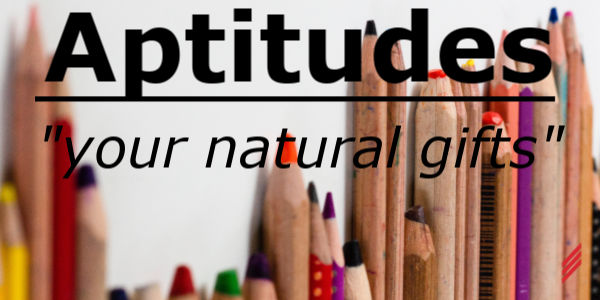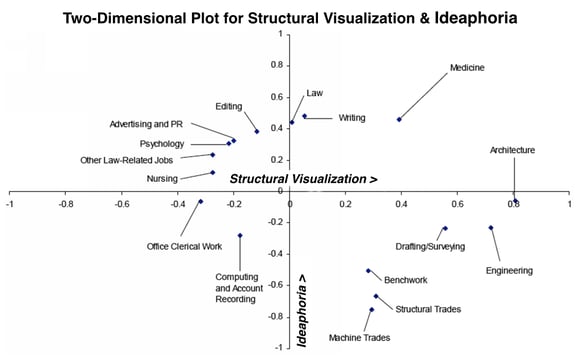Aptitudes – “Your Natural Gifts"
by John Butterfield on Dec 5, 2019 10:26:00 AM

Overview
Do you ever wonder why some people are good at certain activities, and yet struggle with others? When you ask someone about this, the answers are often “Well, it just comes easy for me”, or “I’ve never been good at this kind of thing.” So, why are some people good at organizing paperwork, whereas others naturally gravitate towards creativity? Why is it that some of us can design things in our head, or solve puzzles, or learn a foreign language much easier than others can? And yet, while we may be good at any of these things, others may be able to play a music instrument, paint a picture, or write poetry better than we can.
Most challenging of all are those “dreaded” activities that are about as much fun for us as rolling large rocks up a hill!
The answers to these questions may be how we are “wired” as individuals. Throughout my career, I have always been intrigued by the vastly different natural abilities that each of us have.
So, what does that mean? How do we identify, quantify and apply our natural abilities in order to achieve satisfaction in our personal and professional lives?
I learned that individual talents are based upon both our interests as well as our aptitudes.
Interests and aptitudes
What are interests? Interests are the result of what we experience, what we learn, and whom we know. Interests may change greatly from year to year as our knowledge and experience grows. Interests are influenced by factors outside of us. It is unlikely that we would have the same interests at age fifty that we did when we were sixteen. Dreams of becoming a mechanic can come from a favorite uncle who collects vintage cars. However, just because you have an interest in a particular field doesn’t mean that you would necessarily be good at it. An interest in old cars, or writing, or finance can lead to a rewarding career or hobby; providing it is complementary to our natural abilities.
So, what are aptitudes? Aptitudes are natural talents and abilities for doing certain kinds of things easily and quickly. Aptitudes are what we are born with. They are “how we are wired”. Aptitudes remain fairly stable throughout our lives. They have little to do with knowledge, experience, culture, or education.
Some people can paint beautifully but cannot carry a tune. Others are good at talking to people but slow at paperwork. Still others can easily repair a car but find writing difficult. These basic differences among people are important factors in making one person satisfied as a banker, another satisfied as an engineer, and still another satisfied working as an editor.
Every occupation, whether it is engineering, medicine, law or management, emphasizes a unique combination of aptitudes. The work we are most likely to enjoy and be successful in, is that which uses our strongest aptitudes. For example, if you are an engineer, but possess aptitudes not used in engineering, your work might seem unrewarding, frustrating, difficult or unpleasant.
Dreaming of being a doctor, or being the child of a surgeon, does not mean we will have the necessary abilities to be a successful and satisfied physician. Identifying our natural strengths (ie. aptitudes) is a way to find out which careers are appropriate for us as an individual, regardless of any other factors.
Johnson O’Connor Research Foundation
One of the preeminent organizations in the field of individual aptitude assessment, and job matching is the Johnson O’Connor Research Foundation (www.jocrf.org). Founded in Boston in 1922, the Johnson O’Connor Research Foundation has over 92 years of experience in the study of human aptitudes, and how they fit into an individual’s personal and professional life.
Johnson O’Connor defines an individual’s profile based on 16 different aptitudes. Test scores are neither “good”, nor “bad”. Aptitude scores merely indicate the degree to which, compared to others, a particular task comes easily to you. There is no such thing as a high or a low score, since your profile is what tells the story. In many occupations the characteristic aptitude profile includes some significantly low aptitudes, as well as some high aptitudes. (For example, an artist or a writer might require a lively flow of ideas (ie “Ideaphoria”) in their work, whereas an engineer, a surgeon or a pilot needs to be more analytical and procedural in order not to be distracted from the task at hand.
The 16 different aptitudes defined by Johnson O’Connor are:
|
Aptitude |
Description |
Where Used |
| Structural Visualization | The ability to see objects in 3-dimensions. | Engineering, design, computer programming, physical sciences. |
| Inductive Reasoning | The ability draw conclusions by “connecting the dots” through different information | Investigative fields, research |
| Ideaphoria | Having a creative imagination, being full of ideas | Selling, advertising, writing, teaching |
| Graphoria | Effectiveness in handling clerical and paperwork functions | Banking, accounting, finance, nursing |
| Analytical Reasoning | The ability to select and organize relative information to formulate a solution to the problem | Engineering, sciences, management, planning |
| Numerical Aptitudes | The ability to interpret numerical information and to identify relationships | Statistics, financial analysis, mathematics, economics, analyst |
| Auditory Aptitudes | The ability to discern auditory pitches, rhythms and sequences of tones | Music, languages, audio engineering |
| Silograms | The ability to learn foreign languages | Languages, translation, linguistics, diplomacy, social work. |
| Memory for Design and Observation | The ability to interpret and remember patterns and designs | Architectural, design, engineering, medicine |
| Color Discrimination | The ability to precisely discern shades of colors. | Fashion, design, interior decorating |
| Visual Designs | Artistic ability to recognize visual concepts and to create new ones. | Art, design, decorating, style |
| Dexterities | Level of manual dexterity with fingers and small tools | Surgery, art, culinary, healthcare, restoration, repair. |
| Foresight | The ability to see future, long term possibilities. | Future planning, setting long term objectives. |
| Word Association | Identifies whether a person is subjective or objective, based upon their association with words. | Subject matter expert, vs a generalist? |
| English Vocabulary | The ability to be a flexible communicator through our range of vocabulary. | Unlike the other aptitudes, vocabulary is learned. Writing, speaking, acting |
| Interests | Once a working knowledge of aptitudes is in place, a person’s interests pave the way to success and mastery. | |
Aptitude Profiles – An Example
Structural visualization is the key aptitude for architecture, engineering, design and medicine. Ideaphoria is the ability to generate creative ideas. The following plot illustrates how different careers fit into the Structural Visualization vs. Ideaphoria matrix. (This matrix is taken from “Understanding Your Aptitudes” by the Johnson O’Connor Research Foundation).

My Personal Experience
I was at mid-career when I learned about aptitudes and their impact on personal and professional satisfaction. Up to that time I had worked in large organizations, where I found portions of my work to be challenging. At one point I was working at a large research campus. The work was technically very interesting, but somehow I did not find it to be personally rewarding. I mentioned this to a colleague of mine and he said to me “this place is like a college campus without the exams. It’s beautiful here. You want to leave? ARE YOU CRAZY???”
But leave I did. After understanding the influence of aptitudes on career satisfaction, my profile indicated that I should be working in a smaller, specialized, technical company. I realized then that the issue wasn’t me, and it wasn’t the company; it was simply that we were not a good match for each other. Discovering my own natural talents ultimately led me to a 30 year career at Hallam-ICS. This put me right where I belonged; in a smaller, specialized, technical company.
If I had it to do over again, I would have learned about aptitudes earlier in life. But as they say: “better late than never”.
In Conclusion:
Understanding how we are wired, through our aptitudes, is an excellent tool for persons of all ages who seek a better understanding of where they will find success and satisfaction in their professional and personal lives. I highly recommend it.
For more information on this subject, please visit the Johnson O’Connor Research Foundation Website (www.jocrf.org).
About the author
John has retired from Hallam-ICS, but his contributions to the company continue to be valued.
Read My Hallam Story
About Hallam-ICS
Hallam-ICS is an engineering and automation company that designs MEP systems for facilities and plants, engineers control and automation solutions, and ensures safety and regulatory compliance through arc flash studies, commissioning, and validation. Our offices are located in Massachusetts, Connecticut, New York, Vermont and North Carolina and our projects take us world-wide.
You May Also Like
These Related Stories

Can Colorblind People Work in the Electrical Field?

What is a Variable Frequency Drive, and Should I Use One?




Comments (1)